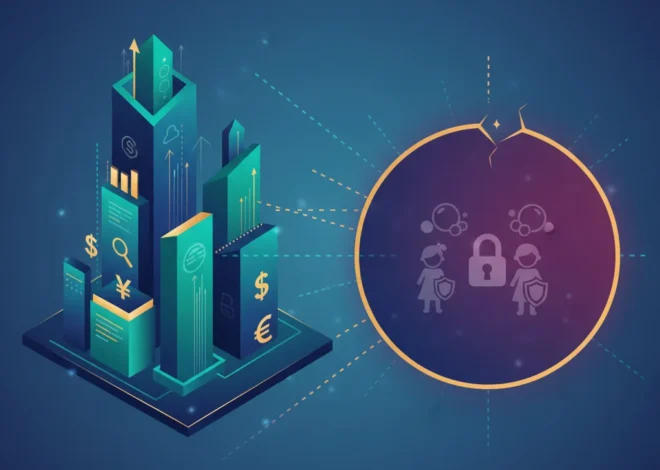
The Walled Gardens Are Trembling: Why the UK is Taking a Sledgehammer to Apple and Google’s App Stores
Ever stopped to think about the invisible walls surrounding your smartphone? Every app you download, every game you play, and every in-app purchase you make passes through a gate guarded by one of two giants: Apple or Google. For over a decade, this has been the undisputed reality of the mobile world. But the ground is starting to shake. In the UK, a regulatory earthquake is brewing, and its tremors could permanently reshape the digital landscape we navigate every day.
The UK’s Competition and Markets Authority (CMA) has fired a significant warning shot, declaring that Apple and Google wield an “effective duopoly” over the mobile ecosystem. According to a recent report from the BBC, the regulator is signaling that it may force these tech titans to dismantle parts of their carefully constructed “walled gardens.” This isn’t just another headline; it’s a fundamental challenge to the business models that have defined the multi-trillion-dollar app economy.
For developers, entrepreneurs, and tech professionals, this is a pivotal moment. The outcome could unlock unprecedented levels of innovation or unleash a wave of fragmentation and cybersecurity risks. For the average user, it could mean more choice and lower prices, or a more complicated and less secure mobile experience. Let’s break down what’s happening, why it matters, and what the future of mobile software might look like.
The Core of the Conflict: Unpacking the CMA’s Concerns
The CMA’s investigation didn’t mince words. After a year-long study into mobile ecosystems, it concluded that Apple and Google’s market power is so entrenched that it harms consumers and stifles competition. The regulator has been granted new powers under the Digital Markets, Competition and Consumers (DMCC) Act, allowing it to proactively address these issues rather than just reacting to them.
So, what are the specific problems the CMA has identified? While the full report is extensive, the key concerns can be summarized into a few critical areas. These are the pillars of the duopoly that regulators are now targeting.
Here’s a breakdown of the CMA’s primary arguments against the current structure of Apple’s and Google’s mobile ecosystems:
| Area of Concern | Apple (iOS) | Google (Android) |
|---|---|---|
| App Distribution | The App Store is the only permitted method. Sideloading (installing apps from outside the store) is blocked. | The Google Play Store is the default, but sideloading is technically possible, though often discouraged with security warnings. |
| In-App Payments | Developers must use Apple’s payment system for digital goods, which takes a 15-30% commission. | Developers must use Google’s billing system for digital goods on the Play Store, also with a 15-30% commission. |
| Browser Engines | All browsers on iOS (including Chrome and Firefox) must use Apple’s WebKit engine. | Google allows other browser engines but heavily favors its own Blink engine (used in Chrome). |
| Cloud Gaming | Strict rules have historically limited cloud gaming apps that stream games from the cloud, often forcing them to use web apps. | More lenient, but the primary distribution via the Play Store still gives Google significant control. |
These controls, the CMA argues, create a vicious cycle. Dominance in operating systems (iOS and Android) leads to dominance in app stores, which in turn reinforces the dominance of their operating systems. For startups and developers, this means playing by a set of rules they have no power to change, including surrendering a significant portion of their revenue for the privilege of reaching customers.
From Stun Guns to Smart Clouds: The AI-Powered Future of Taser Technology
The Fortress or the Prison? Debating the “Walled Garden”
Apple and Google have long defended their ecosystem controls with a simple, powerful argument: security and user experience. They contend that their curated app stores protect users from malware, scams, and poorly functioning apps. By forcing all software through a single, vetted gateway and managing payments, they create a seamless and safe environment that people can trust.
There’s certainly truth to this. The streamlined nature of the App Store and Google Play is a major reason for their success. Users don’t have to worry about complex installation processes or whether their payment details are secure. This curated approach has undoubtedly prevented countless cybersecurity incidents.
However, critics argue that these “walled gardens” have become gilded prisons. Developers, especially smaller ones, feel the squeeze from several directions:
- The “App Tax”: The 15-30% commission on in-app purchases is a major point of contention. For a new SaaS (Software as a Service) startup, giving up nearly a third of revenue can be the difference between profitability and failure.
- Stifled Innovation: App review processes can be opaque and arbitrary. Rules can change without warning, sometimes rendering entire business models obsolete overnight. The restriction on browser engines, for example, means that true competition in web browsing performance and features is impossible on iOS.
- Lack of Direct Customer Relationships: By controlling the payment process, the platform holders insert themselves between the developer and their customer, making it harder to manage subscriptions, offer flexible pricing, or handle disputes directly.
This debate strikes at the heart of the tech world’s central tension: the trade-off between open, chaotic innovation and closed, stable security. The early internet was a wide-open frontier, while the modern mobile ecosystem is more like a collection of pristine, privately-owned cities.
The real question is, are we ready for the consequences? An open ecosystem could supercharge innovation, especially in burgeoning fields like on-device artificial intelligence, where developers might need deeper access to hardware than platforms currently allow. Imagine AI-powered tools that aren’t constrained by Apple’s rules on background processing or data access. However, it also opens a Pandora’s box of potential issues: rampant malware, confusing user experiences with multiple app stores, and a support nightmare for both users and developers. This isn’t just about changing the rules; it’s about fundamentally altering the user-platform relationship we’ve grown accustomed to for the last 15 years. The “simplicity vs. freedom” debate is about to move from theory into practice.
The Ripple Effect: What This Means for Everyone
If the CMA forces Apple and Google to open up their platforms, the changes will cascade through the entire tech industry. This isn’t a minor tweak; it’s a paradigm shift with clear winners and losers.
For Developers and Tech Professionals:
The most immediate impact will be on those who build the apps. The potential for sideloading or third-party app stores on iOS is a game-changer. Developers could bypass the 30% commission, offer alternative payment systems, and engage directly with their users. This is a massive boon for anyone in software development, from a solo indie developer to a large SaaS enterprise. However, it also introduces complexity. Instead of one set of programming guidelines and one store to target, they may need to manage multiple versions, stores, and payment processors. This could increase the need for automation in testing and deployment pipelines. A recent Statista report shows over 255 billion app downloads in 2022, highlighting the immense scale of the market that’s being contested.
The Billion Handshake: Why Tech Giants Are Buying the Physical 'Warehouses' of the AI Revolution
For Startups and Entrepreneurs:
For startups, this could be a golden opportunity. Lowering the “app tax” frees up crucial capital that can be reinvested into product development, marketing, or hiring. The ability to innovate without seeking permission from a platform gatekeeper could unlock entirely new categories of apps, particularly those leveraging cutting-edge machine learning models or unique hardware integrations. Imagine a startup creating a revolutionary AI photo editor that can offer its own subscription model directly from its website, completely bypassing the App Store. This lowers the barrier to entry and fosters a more competitive environment.
For Consumers:
The end-user experience could see the most dramatic changes. On the plus side, competition could drive down prices for apps and in-app purchases as developers pass on their savings. We could see a wider variety of apps that wouldn’t have been approved under the current strict guidelines. The downside is the potential for a less secure, more fragmented experience. Users will need to be more vigilant about where they download apps from, and the “it just works” simplicity of the current model could be a thing of the past. As the EU’s Digital Markets Act (DMA) has shown, these changes are already on the horizon in Europe, providing a test case for what might happen in the UK (source).
A Global Movement Towards Openness
The UK’s actions are not happening in a vacuum. They are part of a global wave of regulatory scrutiny aimed at Big Tech. The European Union’s Digital Markets Act (DMA) is perhaps the most significant parallel, already forcing Apple to allow third-party app stores and payment systems within the EU. In the United States, the Epic Games vs. Apple lawsuit brought many of these issues into the public consciousness, and legislative efforts continue to bubble under the surface.
This coordinated global pressure makes it increasingly difficult for Apple and Google to maintain different rules for different regions. While they may try to implement changes on a country-by-country basis, the long-term trend points towards a more open and standardized global framework. The tech giants are fighting a multi-front war against regulators who are more empowered and coordinated than ever before.
The Billion Handshake: Why Tech Giants Are Pouring a Fortune into AI's Physical Backbone
The Future is Unwritten, But The Direction is Clear
The battle for the future of the mobile ecosystem is just beginning. The CMA’s declaration is a clear statement of intent, but the exact remedies and their implementation will be the subject of intense negotiation and, likely, legal challenges. Apple and Google will undoubtedly argue that the proposed changes will fundamentally compromise the security and privacy of their users.
However, the tide has turned. The era of the unchallenged, closed mobile ecosystem is coming to an end. The key question is no longer *if* these walled gardens will be opened, but *how*. The challenge for regulators, developers, and the platform holders themselves will be to strike a new balance—one that fosters competition and innovation without sacrificing the security and simplicity that made smartphones so revolutionary in the first place.
For everyone in the tech world, from the largest corporation to the smallest startup, this is a time to watch, adapt, and prepare. The very definition of a mobile app is about to be rewritten.


